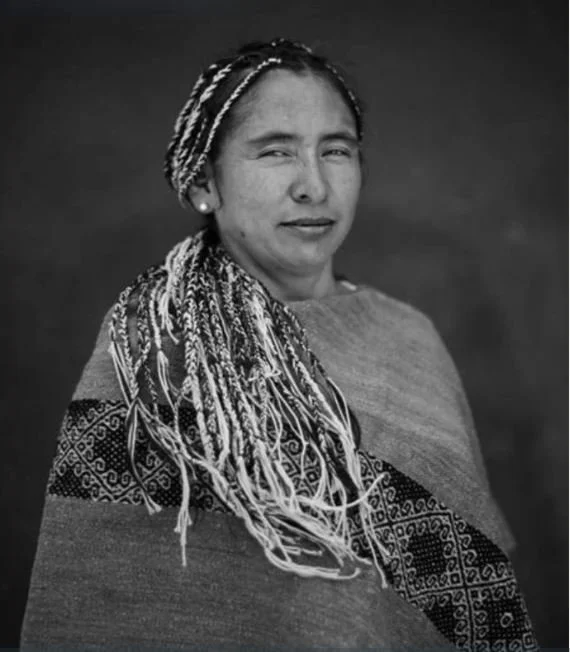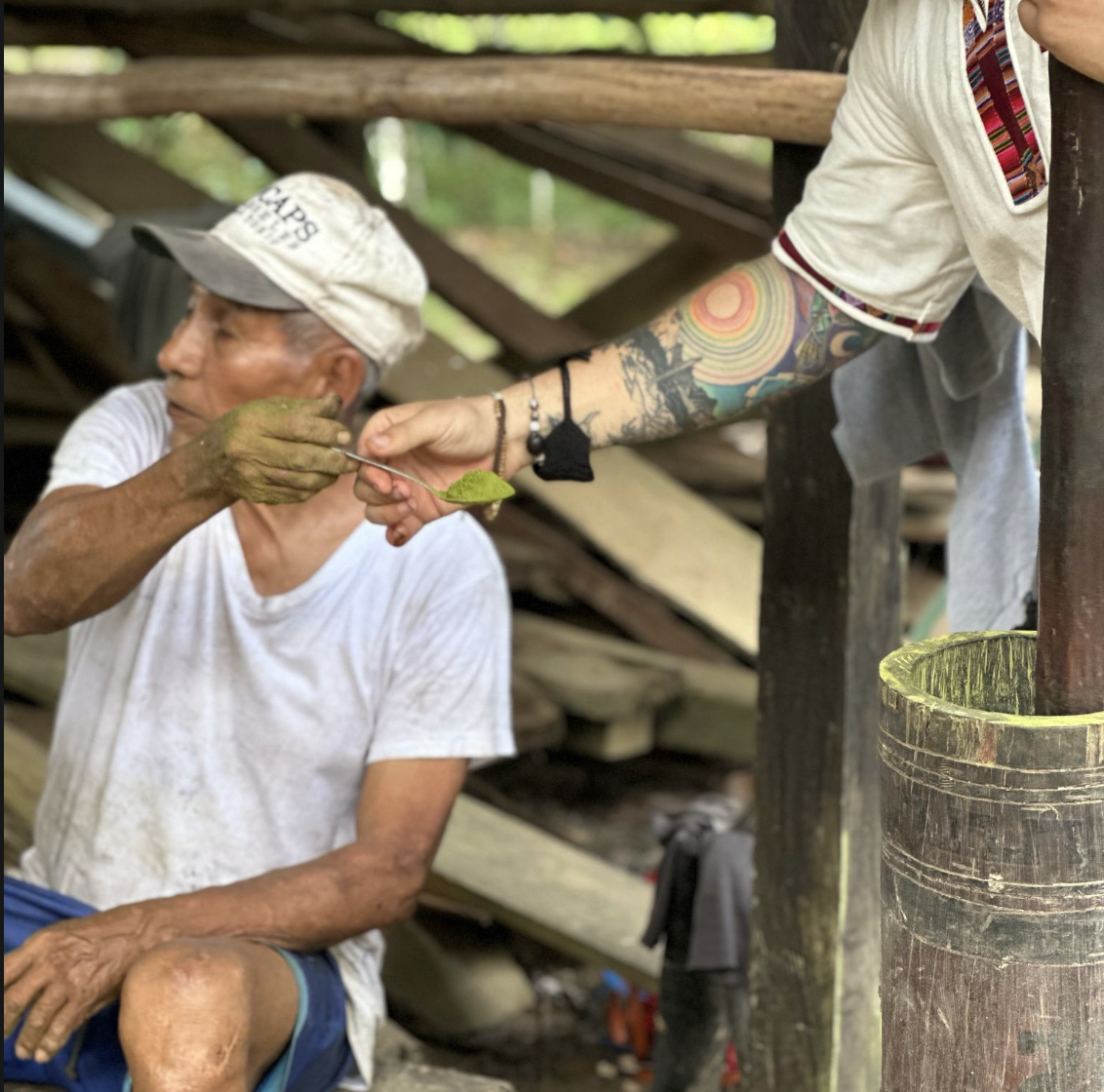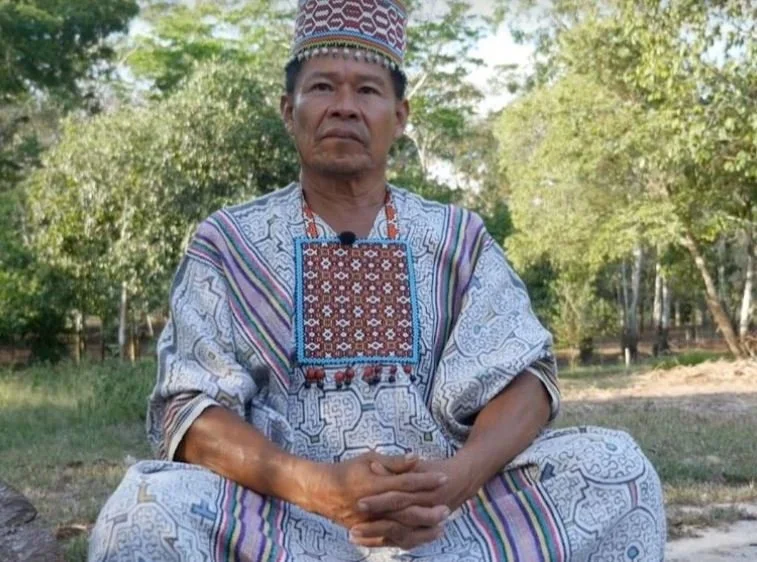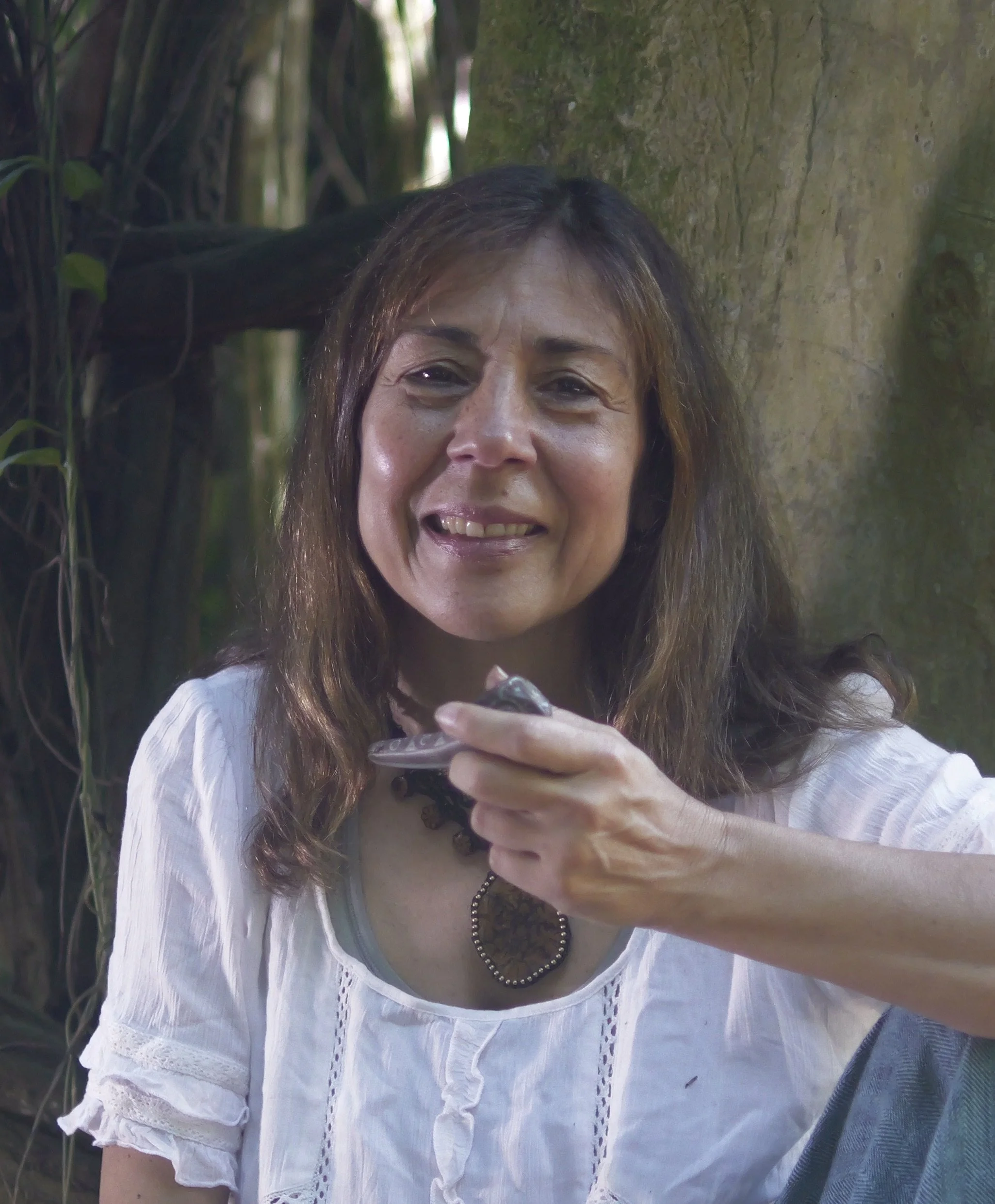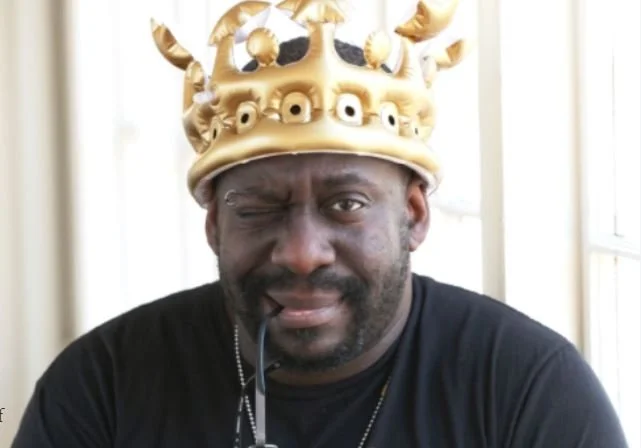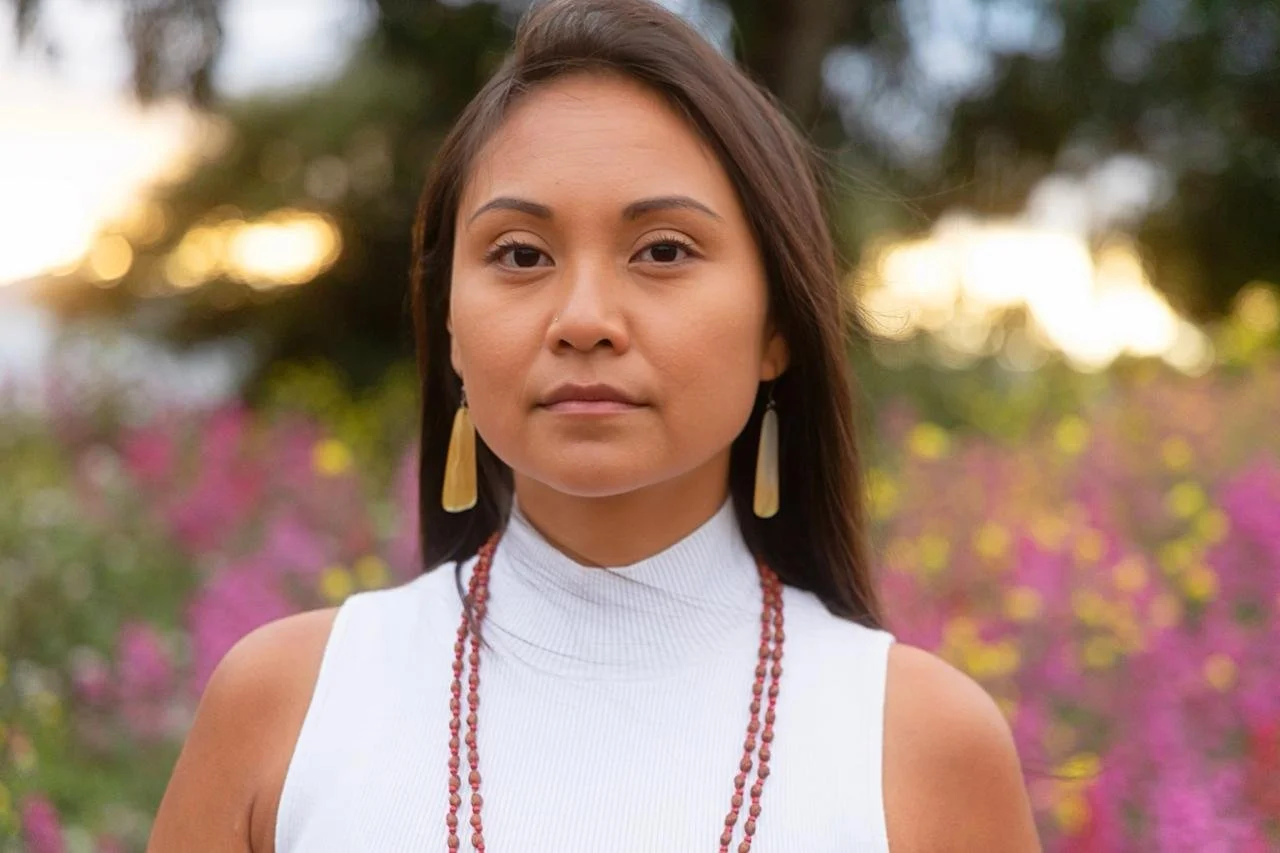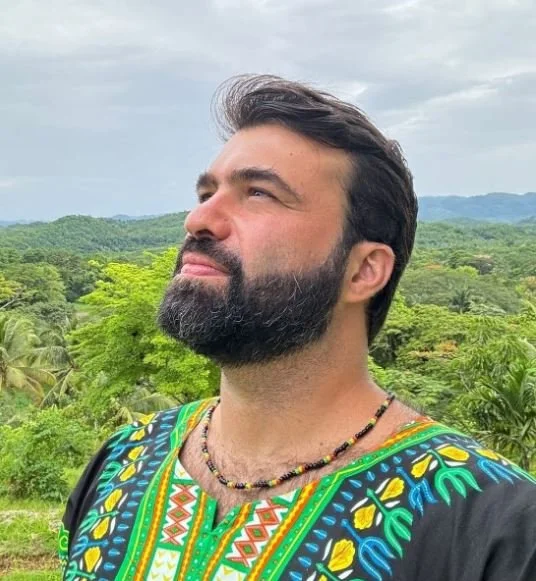Preview of the Indigenous Elders of Sacred Medicines 2025
Chief Alvaro Tukano
Álvaro Tukano, also known as Doéthiro, is a distinguished leader of the Tukano people from the Alto Rio Negro region in Brazil. The Tukanos are regarded amongst the first ethnic groups to use ayahuasca, going back to 10,000 years ago according to some estimates. Born and raised within his community, he has been a pivotal figure in advocating for indigenous rights and the preservation of ancestral traditions and considered one of the founding fathers of the indigenous rights movement in the region.
As a respected elder and medicine holder, Álvaro has dedicated his life to the sacred practices of his people, particularly the ceremonial use of ayahuasca and rapé. These rituals, rooted in millennia-old traditions, are integral to the Tukano's spiritual and cultural identity. In the 1970s, Álvaro co-founded the Union of Indigenous Nations (UNI), playing a crucial role in uniting various indigenous groups across Brazil. His leadership extended to the Indigenous Peoples' Memorial in Brasília, where he served as director, furthering the cause of indigenous representation and rights.
Álvaro's contributions to literature include his work titled "Tembeta," which offers insights into indigenous perspectives and challenges.His participation in the Sacred Medicines Conference underscores his commitment to sharing indigenous knowledge and promoting the responsible use of sacred plant medicines.
Oseas Barbarán Sánchez
Oseas Barbarán Sánchez is a Shipibo-Konibo leader and advocate for indigenous sovereignty and ancestral medicine. As President of the Confederation of Amazonian Nationalities of Peru (CONAP), the largest indigenous organization in Perú, he represents 944 indigenous communities across seven regions of the Peruvian Amazon, defending their rights, cultural heritage, and sacred territories.
Rooted in his Shipibo traditions from the Ucayali River where he still lives, Oseas has spent decades protecting and revitalizing Amazonian plant medicine practices. Since 2007, Oseas has strengthened CONAP, leading efforts to secure direct international funding for large-scale projects that empower indigenous knowledge, governance, and sustainable living. He has represented indigenous peoples before the United Nations, the GCF Task Force, COP and the International Land Coalition, amongst others
His participation in the Sacred Medicines Conference offers a unique perspective on the millennia-old healing traditions of the Shipibo people and the intersection of plant medicine, indigenous rights, and environmental preservation in today’s world.
Ruro Caituiro Monge
Ruro Caituiro Monge is a traditional Andean midwife, temazcalera (sweat lodge guide), and healer, dedicated to preserving and sharing ancestral birthing, herbal medicine, and rituals to work around individuals' birth experience. Born in the Apurímac region of the Peruvian Andes, she carries forward a lineage of indigenous midwifery that honors the spiritual and physical dimensions of birth.
As the founder of Ruruchay Birthing House in the Sacred Valley, Ruro has created a sanctuary where women can experience natural, sacred births, combining traditional Andean techniques, water birth, and plant-based healing. A temazcal (sweat lodge) guide, Ruro leads ceremonies that support women’s transitions: pregnancy, postpartum, and personal healing.
Beyond her hands-on practice, Ruro is a mentor and teacher, sharing indigenous wisdom with midwives, birth workers, and seekers worldwide. She is a fierce advocate for culturally rooted birth sovereignty, ensuring that Andean midwifery remains a thriving, respected tradition for generations to come.
Taita Gilberto
Taita or “abuelo” Gilberto, is one of the main elders from the Kameramui people in the Colombian Jungle. He is a carrier of the mambe and ambil medicines, with his people being one of the original seven ethnicities to receive the care of this medicine thousands of years ago.
In the mambe and ambil ceremonies, words play a central role as participants weave together their thoughts and prayers into sometimes days-long ceremonies in which they stay awake in contemplative prayer. Abuelo Gilberto is an incredible story teller, illuminating upon the nature of medicine, healing and the natural order through the ancient myths and stories of his people.
Having resided most of his life in his community, Gilberto has only recently begun travelling to other places carrying the teachings of mambe and ambil with him, sharing a highly misunderstood medicine of which very little research has been done so far despite being regarded as one of the most important sacred medicines for many indigenous peoples. In many cosmovisions, mambe and ambil are regarded as the “parents” of ayahuasca.
Edinson Ramos
Edinson Ramos is a Shipibo Elder, descendant of a long line of healers with uninterrupted transmission of their ancestral healing practices and knowledge. He was born and raised in a Shipibo community in the Peruvian Amazonic region of the Ucayali River, where he still lives and receives people from all over the world to guide them through deep ayahuasca treatments usually involving “dietas” with some of the many medicinal plants he grows and cares for in his land.
Edinson has been a community leader for the Indigenous community of San Francisco and Director of Indigenous Health for the Shipibo-Konibo-XeteboAssociation of Ancestral Healers. He is profoundly knowledgeable about the traditions of his people and a methodical and articulate teacher, able and inspired to help transmit and decodify the insights of his lineage for people who want to learn about the medicine in a sincere way.
A Peek at our Bridgers
Since this conference will delve deep on inter-paradigm dialogue, the conversations with the elders and integrations will be supported by a seasoned and diverse team of “bridgers,” formed by scholars and community practitioners with profound knowledge and experience with psychedelic medicines, Indigenous traditions and group facilitation. These individuals will be present in different cohorts, serving to bridge the wisdom of the indigenous elders with the learning process of the participants.
Dr. Susana Bustos
Susana Bustos, PhD, is a psychotherapist, music therapist, and researcher specializing in entheogenic healing, expanded states of consciousness, and integration practices. A Holotropic Breathwork practitioner since 1999, she has studied Amerindian entheogenic traditions for over 20 years, focusing on healing songs and plant medicine practices. She co-founded the Escuela de Psicovegetalismo, dedicated to bridging ancestral plant medicine wisdom with Western therapeutic frameworks, and teaches in psychedelic-assisted therapy programs in the Bay Area and abroad.
At BSCP, she leads the Ancestral Entheogenic Traditions curriculum, exploring the relationship between human healing systems and nature’s intelligence. From 2016-2020, she directed the Spiritual Emergence Network U.S., supporting individuals navigating psychedelic-induced spiritual crises. She has published on shamanic song, healing, and psychedelic integration, and lectures internationally on bridging indigenous knowledge and Western therapy for safe, effective, and ethically grounded psychedelic work.
Ayize Jama Everett
Ayize Jama-Everett, MDiv, MA, MFA, is a therapist, educator, and advocate focused on psychedelics, mental health, and social justice. With master’s degrees in Divinity, Psychology, and Fine Arts, he explores the role of psychedelics in therapy, spirituality, and cultural healing. At Starr King School for the Ministry, he teaches "The Sacred and the Substance," a course on entheogens in religious traditions, and leads the Psychedelics and the Seminary lecture series. He produced the documentary "A Table of Our Own," amplifying Black perspectives on psychedelics, and co-organized a conference of the same name exploring ayahuasca and plant medicine healing.
Jama-Everett serves on the boards of the Tupac Amaru Shakur Foundation, focusing on psychedelics in marginalized mental health, and Access to Doorways, increasing BIPOC and LGBTQ+ representation in psychedelics. He advises Psychedelics Today’s VITAL training program and has worked with UC Berkeley’s Center for Psychedelic Science and CIIS’ Psychedelic Therapies program.
Marlena Robbins
Marlena Robbins is a Doctor of Public Health (DrPH) candidate at the University of California, Berkeley, specializing in the intersection of Indigenous knowledge, psychedelic science, and mental health policy. Her research and practice focus on developing culturally informed frameworks that integrate traditional healing practices with modern public health approaches, with an emphasis on policy analysis, program evaluation, and community-led health initiatives.
Robbins collaborates with tribal leaders, public health officials, and research institutions to advance equitable and culturally grounded approaches to psychedelic-assisted therapy. Her work includes contributions to the Berkeley Center for the Science of Psychedelics, the Substance Abuse and Mental Health Services Administration (SAMHSA), and the Colorado Natural Medicine Tribal Working Group. She has played a key role in tribal engagement strategies, regulatory discussions, and the development of educational programs aimed at fostering ethical and community-driven approaches to psychedelics.
Her research explores multigenerational perspectives on psilocybin use, the policy landscape of SB 1012, and human-centered design approaches to integrating Indigenous healing into contemporary mental health care. She has developed tribal engagement toolkits for psychedelic policy, evaluated nonprofit psychedelic therapy programs, and co-created community-driven models for psychedelic-assisted care in Native-serving clinics.
Glauber Loures de Assis
Dr. Glauber Loures de Assis is a researcher of sacred plants and their traditions and a psychedelic dad. He has a Ph.D in sociology from the Federal University of Minas Gerais (UFMG). He is the author of numerous articles and book chapters, and the co-editor of the book Women and Psychedelics: Uncovering Invisible Voices (Synergetic Press). Glauber is the founder and president of Céu da Divina Estrela, a legal and tax-exempt Santo Daime ayahuasca church in Brazil. He has 15 years of experience with ayahuasca and other sacred plants and has led more than 500 ceremonies in Brazil, Europe and the United States, and has built this practice in dialogue with his local Brazilian ayahuasca community and with the blessings of Indigenous elders and activists in Brazil.
He is also the co-founder of Jornadas de Kura, a plant medicine center in Brazil that promotes an alliance between the ceremonial use of sacred plants, public education on plant medicine and psychedelic science. He is an Indigenous rights activist and the Director of the Psychedelic Parenthood Community. He is father to 3 children and lives with his wife Jacqueline Rodrigues in Santa Luzia, Minas Gerais, Brazil.Glauber is driven by the desire to collectively co-create a plant medicine community in which all families are safe, welcome and integrated into the psychedelic field. A community in which diversity is embraced, children and elders are taken seriously, ancestral Indigenous traditions are honored, and where all kinds of families can coexist in solidarity.


